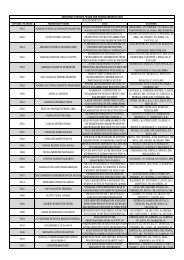immunology of infectious and parasitic diseases - XXXVII Congress ...
immunology of infectious and parasitic diseases - XXXVII Congress ...
immunology of infectious and parasitic diseases - XXXVII Congress ...
Create successful ePaper yourself
Turn your PDF publications into a flip-book with our unique Google optimized e-Paper software.
INDUCTION OF TH17 LYMPHOCYTES CONTROLS MYOCARDITIS DURING<br />
Trypanosoma cruzi INFECTION BY RESTRAINING A DETRIMENTAL TH1<br />
RESPONSE<br />
TIAGO DA SILVA MEDINA (1) ; GRACE KELLY SILVA (1) ; DENISE MORAIS<br />
FONSECA (1) ; RENATA SESTI-COSTA (1) ; MARIA CLÁUDIA SILVA (1) ;<br />
BERNARD RYFFEL (2) ; JOÃO SANTANA SILVA (1) .<br />
(1) Laboratório de Imunoparasitologia da Faculdade de Medicina de<br />
Ribeirão Preto, Universidade de São Paulo - Ribeirão Preto, Brasil<br />
(FMRP-USP).<br />
(2) Centre National de la Recherche Scientifique (CNRS), Orléans, France.<br />
Introduction: Trypanosoma cruzi infection predominantly induces a Th1<br />
response to control the parasite proliferation; nevertheless an exacerbated Th1<br />
response is deleterious to the host. Objective: Because the microenvironment<br />
plays a crucial role during CD4 + T cell differentiation, we sought to underst<strong>and</strong><br />
how the immune response is regulated in the absence <strong>of</strong> molecules involved<br />
with Th17 lymphocytes differentiation <strong>and</strong> maintenance. Results: After infecting<br />
WT, IL-17R -/- , IL-23 -/- <strong>and</strong> IL-6 -/- mice with 10 3 forms <strong>of</strong> T. cruzi (Y strain), we<br />
observed that IL-17R -/- , IL-23 -/- <strong>and</strong> IL-6 -/- mice rapidly succumb to T. cruzi<br />
infection compared with WT mice. As T. cruzi mainly affects the heart tissue, we<br />
analyzed the inflammation in this organ. Inflammation in the heart tissue was<br />
very impressive in IL-17R -/- , IL-23 -/- <strong>and</strong> IL-6 -/- mice, which was important to<br />
control the cardiac parasitism compared with WT mice. Heart inflammation<br />
somewhat promoted cardiac damage in IL-17R -/- , IL-23 -/- <strong>and</strong> IL-6 -/- mice,<br />
indicated by high CK-MB serum levels. To assess the mechanisms related to<br />
the premature death in the absence <strong>of</strong> Th17 molecules, we verified that<br />
macrophages from IL-17R -/- , IL-23 -/- <strong>and</strong> IL-6 -/- mice eliminate the parasite more<br />
efficiently than macrophages from WT mice, by expressing augmented iNOS<br />
<strong>and</strong> NO levels. We also verified that IL-17R -/- , IL-23 -/- <strong>and</strong> IL-6 -/- mice induced an<br />
increased, deleterious Th1 response in the heart tissue when compared with<br />
WT mice, indicated by high levels <strong>of</strong> IFN-γ, IL-12, iNOS <strong>and</strong> TNF. Corroborating<br />
these data, we detected increased levels <strong>of</strong> CXCL9 <strong>and</strong> CXCL10 chemokines<br />
(associated with Th1 migration), but reduced levels <strong>of</strong> CCR6 (expressed on<br />
Th17 cells), in the heart tissue <strong>of</strong> IL-17R -/- , IL-23 -/- <strong>and</strong> IL-6 -/- mice when<br />
compared with WT mice. This intense Th1 response was not efficiently<br />
regulated by anti-inflammatory pathways, as observed by decreased IL-10<br />
levels in the heart <strong>of</strong> IL-17R -/- , IL-23 -/- <strong>and</strong> IL-6 -/- mice compared with WT mice.<br />
To confirm the importance <strong>of</strong> regulatory mechanisms, we observed that WT<br />
mice induced high amounts <strong>of</strong> regulatory T cells 21 days after infection, the<br />
period that coincide with the death <strong>of</strong> IL-17R -/- , IL-23 -/- <strong>and</strong> IL-6 -/- mice,<br />
suggesting that these cells are controlling the local inflammatory response.<br />
Conclusion: Collectively, Th17 cells control myocarditis during T. cruzi



